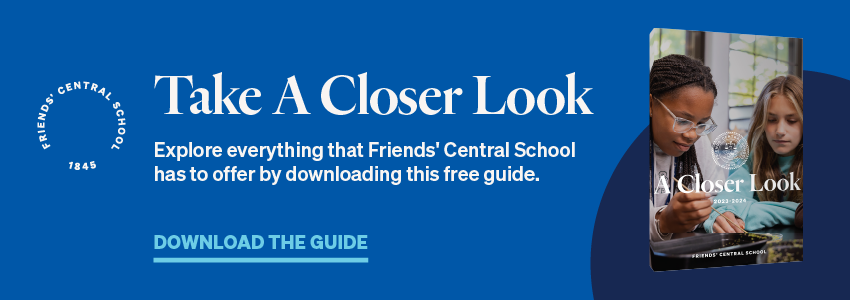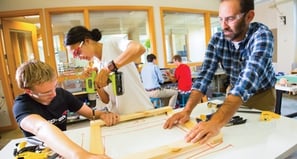 Maker Education is part of an educational revolution that empowers students and positions them to engage and take responsibility. Our world faces urgent environmental and social issues, and if we want to prepare our students to affect change, we need to instill in them an alertness to these conditions and a sense of confidence that they can create solutions to solve them.
Maker Education is part of an educational revolution that empowers students and positions them to engage and take responsibility. Our world faces urgent environmental and social issues, and if we want to prepare our students to affect change, we need to instill in them an alertness to these conditions and a sense of confidence that they can create solutions to solve them.
Give the pupils something to do, not something to learn; and the doing is of such a nature as to demand thinking; learning naturally results.” --John Dewey
To feel meaningful and important to students, Maker Education can’t be done in isolation; it must be fully and truly integrated into the program and curriculum of a school. It is a framework for thinking and learning - one that does not assume there is one expert or one correct way to find an answer.
Free Downloadable Guide: Take a Closer Look at Friends' Central School
In the end, Maker Education is not about the cardboard, the 3D printer, the computer, or the dremel. It is about the way these objects, and makerspaces in general, are catalysts for excellent teaching and learning. It engenders a way of thinking and a way of approaching learning.
1. Excellent teachers are the backbone of the Maker Education revolution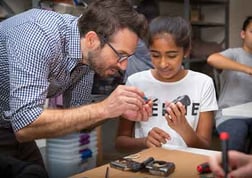
Excellent teaching is agile, flexible, responsive, facilitative, and individualized. Expert teachers who want to stay at the top of their game reflect on their practice and seek out new resources; they collaborate with colleagues and refine what they do. Innovation is a direct result of excellent teaching.
2. Connections and Deeper Understanding
Make Ed is about connections between disciplines and deepening the value in learning. For example, when students visualize a challenge and design their own solutions, they draw on lessons they’ve learned across subject areas - math, English, science, social studies, and art. The projects they create demonstrate an understanding that extends well beyond what a simple test or report would have required.
...if the learner has agency and responsibility over their own learning, they gain trust, not just the trust of the adults in the room, but trust in themselves as powerful problem-solvers and agents of change.” --Sylvia Libow Martinez, author of Invent to Learn: Making, Tinkering and Engineering in the Classroom
3. Choices Equal Agency
Maker Ed empowers students by giving them choices and challenges. When students are allowed to pick the media they will use to demonstrate their new, deep learning, they invest themselves more fully and delve more deeply into their work.
4. Creating and Iterating Develop Strong Work Habits
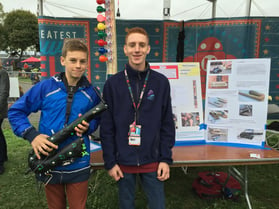 Maker Ed provides opportunities to visualize success and then design the means to create success. As in life, a first creative effort often doesn’t succeed, but the creativity sparked by Maker Ed and the passion to pursue a goal - to tinker, edit, and adjust until success is achieved or not - is real preparation for life. And, along with strong work habits, it guarantees deeper and more meaningful understanding.
Maker Ed provides opportunities to visualize success and then design the means to create success. As in life, a first creative effort often doesn’t succeed, but the creativity sparked by Maker Ed and the passion to pursue a goal - to tinker, edit, and adjust until success is achieved or not - is real preparation for life. And, along with strong work habits, it guarantees deeper and more meaningful understanding.
5. Our youngest students are ready!
Three-year-olds can be at the center of mixing 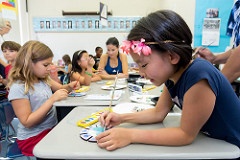 ingredients to make their own playdough, experimenting with proportions and colors until the dough’s consistency and color meets the student’s vision. Having the opportunity to affect systems and objects in their environment is the first step in helping children to see the potential they have to peacefully transform the world. It is never too early!
ingredients to make their own playdough, experimenting with proportions and colors until the dough’s consistency and color meets the student’s vision. Having the opportunity to affect systems and objects in their environment is the first step in helping children to see the potential they have to peacefully transform the world. It is never too early!
We cannot predict what the jobs of the future will look like, but we need to prepare our students nonetheless. the best preparation for uncertainty is creativity, confidence, and hard work. By developing students who can "figure things out,” we will develop the next generation’s leaders.
-Kelly Pierre, Lower School Principal
